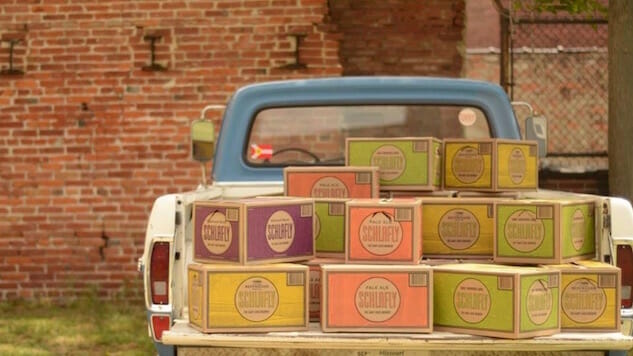5 Questions About the Environment for Schlafly Brewing
Photo via Schlafly Brewing
“We try to leave zip codes better than we found them, though we haven’t left any zip codes,” says Schlafly Beer’s CEO James Pendegraft. It’s a motto the St. Louis brewery takes seriously, both at their brewpub and with their distributed products, vetting vendors along the way to make sure that their business isn’t sending a message they don’t agree with.
Schlafly has worked with their host cities of St. Louis and Maplewood, MO to improve municipal offerings, including a composting system in St. Louis and green energy power for their Maplewood production facility, trying to lead by example.
As breweries grow national and the green movement grows, there’s a bit of contrast between making a brand’s mark and reaching customers. Schlafly recently released a new Hop Trial SMaSH Pack, highlighting four different single malt, single hop recipes, and will celebrate their twenty-fifth anniversary this December. Pendegraft talks about Schlafly’s new “100% Renewable Energy Stamp” and why they decided to include it, and what the industry can do to leave the planet in better shape.
Paste: Why did you decide to use the renewable energy stamp on your packaging?
Pendegraft: This is something that’s been in our DNA since the creation of the brewery. We started in a burned out building in a blighted neighborhood. We recognize we have a role in our communities so this was a way to heighten awareness and get more people involved.
Being in the beer industry and located at the confluence of two of the largest water sources in North America, sustainability is pretty easy for us to do. We’re not importing water from other states and shipping it back out. It’s who we are and what we do. We thought by adding the stamp we could raise awareness and encourage others to follow in our footsteps.
One of the things we’re really proud of is the city that we operate our largest production facility in, Maplewood, which is one of 56 communities in the United States that are recognized for green power. It was because Schlafly led that initiative and got local businesses to join us. We did that in 2012.
Paste: Do you think brewing is on par with other industries, environmentally speaking?
Pendegraft: I think we have the opportunity to move ahead. I don’t think we are ahead, there’s a lot of headroom. It starts off with how we look at transporting our liquids. I’m not trying to call anybody out, but I find it really bizarre for a brewery in California to import the water and just ship it back out. That doesn’t seem right to me.
We’ve got a really small footprint. We’re in 12 states and that’s the extent of our distribution. We try to stay within 300 miles of St. Louis with a couple exceptions. We do take our beer to New York City but that’s something that we weigh very heavily. We don’t have a manifest destiny to go coast to coast. That’s expensive and has a big impact. We like the fact that there are lots of breweries that are local and we hope that they are mindful of the impact they have.
I think the more consumers become aware of the impact on the environment, the more consumers are going to expect producers to act in a sustainable way. I encourage consumers and our employees to make choices and vote with their dollars for brands and organizations that support the causes you believe in.
-

-

-

-

-

-

-

-

-

-

-

-

-

-

-

-

-

-

-

-

-

-

-

-

-

-

-

-

-

-

-

-

-

-

-

-

-

-

-

-








































